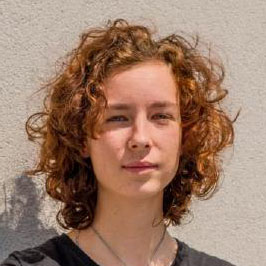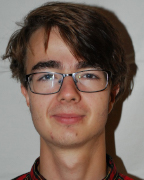News:
- Jan'26: Francesca defended her Ph.D. thesis: Assessment of genetic determinants in E. coli uropathogenic lifestyle and intracellular persistence via optimized k-mer matching of million-genome collections. Congratulations!
- Jan'26: Invited talk at Sapienza University of Rome: From bacteria to bits and back again: towards faster, more accurate, and smarter diagnostics of antibiotic resistence
- Jan'26: Paper on prediction of genetic relatedness of E. coli using neighbor typing published in Antimicrobial Agents and Chemotherapy
- Jan'26: Veronika defended her MSc thesis: Mathematical modeling of phylogenetic compression. Congratulations!
- Jan'26: Arya’s preprint: Novel genes arise from genomic deletions across the bacterial tree of life
- Nov'25: Francesca’s preprint: Optimized k-mer search across millions of bacterial genomes on laptops
- Nov'25: Tam presented at SeqBIM'25: Phylogenetic batching of million-genome collections for reduced storage and faster retrieval
- Nov'25: Paper on FMSI for k-mer indexing using superstrings and the BWT published in Bioinformatics Advances
- Oct'25: Loren started a permanent position at Limoges University Hospital – congratulations!
- Oct'25: Karel gave a keynote at the Czech-French Science Meetup 2025 at the Czech Embassy in Paris: From bacteria to bits and back again: faster, more accurate, and smarter diagnostics of antibiotic resistance
- Oct'25: Marie joined us to work on phylogenetically compressed sketches – welcome!
- Sep'25: Francesca presented at the National Congress of the Italian Society of Microbiology: Rapid search across million-genome bacterial collections on laptops
- Sep'25: New preprint: Neighbour Typing Using LR Sequencing Provides Rapid Prediction of ST and Antimicrobial Susceptibility of K. pneumoniae
- Aug'25: Paper on k-mer set operations via masked superstrings published in the Proceedings of PSC'25
- Jul'25: Ondřej presented at ISMB/ECCB 2025 in Liverpool on indexing k-mer sets using masked superstrings
- Apr'25: Paper on phylogenetic compression published in Nature Methods
- Mar'25: Léo, Francesca, and Karel presented at DSB 2025 in Pisa
- Jan'25: New funding (PHC Barrande): EFFIMAS: Efficient indexing of large genome collections via masked superstrings of k-mers
- Dec'24: Ondřej received the Dean’s Prize for the best computer science BSc thesis at the Faculty of Mathematics and Physics, Charles University, for his work on masked superstrings
- Dec'24: Paper on rapid inference of antibiotic susceptibility of uropathogens published in Microbiology Spectrum
- Nov'24: Veronika received the Stanislav Hanzel Prize for the top nine students at Czech Technical University
About
I hold a permanent PI position at Inria, the French National Institute for Research in Digital Science and Technology. I’m based at the Inria Center at Rennes University, where I’m part of the GenScale project team. I’m also associated with the IRISA Research Institute of Computer Science and Random Systems. Prior to joining Inria in 2022, I was a postdoctoral fellow and a research associate in biomedical informatics and epidemiology at Harvard Medical School and the Harvard T.H. Chan School of Public Health. I received my Ph.D. in computer science from the University of Paris-Est in 2016 and a master’s degree in mathematical computer science from the Czech Technical University in Prague in 2013.
Our research focuses on the intersection of computer science and biology, with applications in epidemiology and medicine. We develop new bioinformatics methods to analyze big genomic datasets, with the ultimate goals of enabling the rapid diagnosis of antibiotic resistance, monitoring of the spread of pathogens worldwide, and enabling instant searches across all publicly deposited DNA sequence data. Our research questions range from the theoretical aspects of computer science to the practical end-to-end protocols used in laboratories. In this context, we are particularly excited about the potential of emerging rapid and portable genomic technologies, such as nanopore sequencing or CRISPR tests.
Download my CV.
People
| Opportunities available at all levels: postdoc / PhD student / intern / research engineer. Don't hesitate to get in touch! |

|
Francesca BrunettiPh.D. student, Sapienza University of Rome, co-supervised with Maria Pia Conte |

|
Léo AckermannPh.D. student, Inria, co-supervised with Pierre Peterlongo |

|
Tam TruongPh.D. student, IRISA, co-supervised with Pierre Peterlongo and Dominique Lavenier |

|
Veronika HendrychováMSc. student, Czech Technical University in Prague |

|
Marie PicardMSc. student, École normale supérieure de Rennes |

|
Ondřej Sladkýexternal collaborator, MSc. student, ETH |
Alumni
- Loren Dejoies, postdoctoral researcher, 2023–2025
- Amory Antao, MSc. student (École normale supérieure de Rennes), 2024–2025
- Ulysse McConnell, BSc. student (ETH Zurich), summer internship project, 2024
- Arya Kaul, visiting Ph.D. student (Harvard Medical School), Chateaubriand fellow, 2023–2024
- Léo Laffeach, MSc. student (École normale supérieure de Rennes), 2022–2023
- Katya Milyutina, BSc. student (Charles University in Prague), 2022–2023
Selected Publications
- K. Břinda, L. Lima, S. Pignotti, N. Quinones-Olvera, K. Salikhov, R. Chikhi, G. Kucherov, Z. Iqbal,
and M. Baym.
Efficient and robust search of microbial genomes via phylogenetic compression,
Nature Methods 22, pp. 692–697, 2025. [PDF] [ReadCube] [software]
- O. Sladký, P. Veselý, and K. Břinda.
Bioinformatics Advances, 2025. [software: FMSI] [supplement]
-
K. Břinda, M. Baym, and G. Kucherov.
Simplitigs as an efficient and scalable representation of de Bruijn graphs,
Genome Biology 22(96), 2021. [preprint] [journal] [software] [supplement]
-
K. Břinda, A. Callendrello, K. C. Ma, D. R. MacFadden, T. Charalampous, R. S. Lee, L. Cowley,
C. B. Wadsworth, Y. H. Grad, G. Kucherov, J. O’Grady, M. Baym, and W. P. Hanage.
Rapid inference of antibiotic resistance and susceptibility by genomic neighbour typing,
Nature Microbiology 5, pp. 455–464, 2020. [preprint] [journal] [software] [supplement]
-
K. Břinda, M. Sykulski, and G. Kucherov.
Spaced seeds improve k-mer-based metagenomic classification,
Bioinformatics 31(22), pp. 3584–3592, 2015. [preprint] [journal] [supplement]
For a full publication list, see Google Scholar.
Methods
A. Phylogenetic compression
Framework implementing phylogenetic compression, a technique using evolutionary history to guide compression and efficiently search large collections of microbial genomes using existing algorithms and data structures. This improves the compression ratios of assemblies, de Bruijn graphs, and k-mer indexes by one to two orders of magnitude.
Associated tools:
- Phylign – BLAST-like search across all pre-2019 bacteria on standard desktops and laptop computers.
- MiniPhy – Phylogenetic compression of extremely large genome collections
B. Metagenomic classification
- ProPhyle - Accurate, resource-frugal, and deterministic metagenomic classification,
based on k-mer propagation, simplitigs,
and k-mer indexing using the Burrows-Wheeler Transform.
C. Genomic Neighbor Typing
A proof-of-concept framework for Genomic Neighbor Typing for within-minutes predictions of antibiotic resistance during nanopore sequencing. Pipeline, library, two species databases (S. pneumoniae and N. gonorrhoeae), and demonstrations of within-minutes diagnostic from isolates and metagenomes.
D. Simplitigs and masked superstrings
Novel generation of text representations for k-mer sets. Simplitigs provide compact representations of k-mer sets by covering de Bruijn graphs with vertex-disjoint paths that spell all original k-mers while drastically reducing sequence count and total length. Masked superstrings generalize this idea to overlap graphs, allowing arbitrary overlaps and using binary masks to eliminate unintended k-mers, which yields even shorter representations and unifies the handling of diverse k-mer sets. Building on these concepts, KmerCamel constructs near-optimal masked superstrings at large scale, and FMSI turns them into highly compressed BWT-based indexes that support fast membership queries and efficient set operations. ProphAsm and ProPhex provide the corresponding practical toolchain for generating these representations and using them in downstream k-mer indexing workflows.
-
FMSI - memory-efficient k-mer set index based on masked superstrings and the Burrows–Wheeler Transform.
-
KmerCamel - compressing k-mer sets using masked superstrings.
-
ProphAsm - rapid and memory-efficient computation of simplitigs (spectrum-preserving string sets) and set operations with k-mer sets.
-
ProPhex An efficient k-mer index based on the Burrows-Wheeler Transform.
E. Other tools
-
RNFtools – A generic format for naming simulated sequencing reads using arbitrary tools and the associated toolkit and pipeline for read simulation and read mapper evaluation.
-
SAMsift – Advanced filtering and tagging of SAM/BAM alignments using Python expressions.
-
Disty McMatrixFace – Tool for computing a distance matrix from a core genome alignment.
-
NanoSim-H – An easy-to-use simulator of nanopore reads, a fork of NanoSim.
For a full software list, see the Github page.
Teaching
École normale supérieure de Rennes
-
Experimental Bioinformatics; BOX (Falls 2023, 2024, 2025, Lecturer)
Masters' level course (M1), focused on computational methods for genomics. Taught jointly with Léo Ackermann (before 2025 with Riccardo Vicedomini).
Harvard Medical School
-
Concepts in Genome Analysis; BMIF 201 (Fall 2019; TA)
PhD level course, focused on quantitative aspects of genetics and genomics, including computational and statistical methods of genomic analysis. Close collaboration with Profs. Shamil R. Sunyaev, Michael Baym, Cheng-Zhong Zhang, and Heng Li.
Czech Technical University in Prague
-
Assistive Technology; 01ASTE (Falls 2010–2012; Instructor)
Masters' level course.
-
Software Project; 01SWP1, 01SWP2 (Falls and springs 2010–2012; Supervisor)
Masters' level course.
Selected media coverage
Interviews
-
BBC World Service – Science in Action – 13 Feb 2020
Our paper about rapid diagnostics of antibiotic resistance was covered by BBC World Service in the show Science in Action (13 Feb 2020; starts at 8.10 minutes). 2020-BBC-ScienceInAction-GNT.mp3
-
The Bioinformatics Chat – Spectrum-preserving string sets and simplitigs – 28 Feb 2020
Our paper about simplitigs for an efficient and scalable representation of de Bruijn graph was covered by the The Bioinformatics Chat podcast series (#42, 28 Feb 2020). 2020-TheBioinformaticsChat-Simplitigs.mp3
Other media coverage
Contact
- [email protected]
- +33 (0)2 99 84 22 77
-
GenScale, Inria/IRISA
Campus de Beaulieu
35042 Rennes
France - Office A122 (orange floor)
- DM Me








